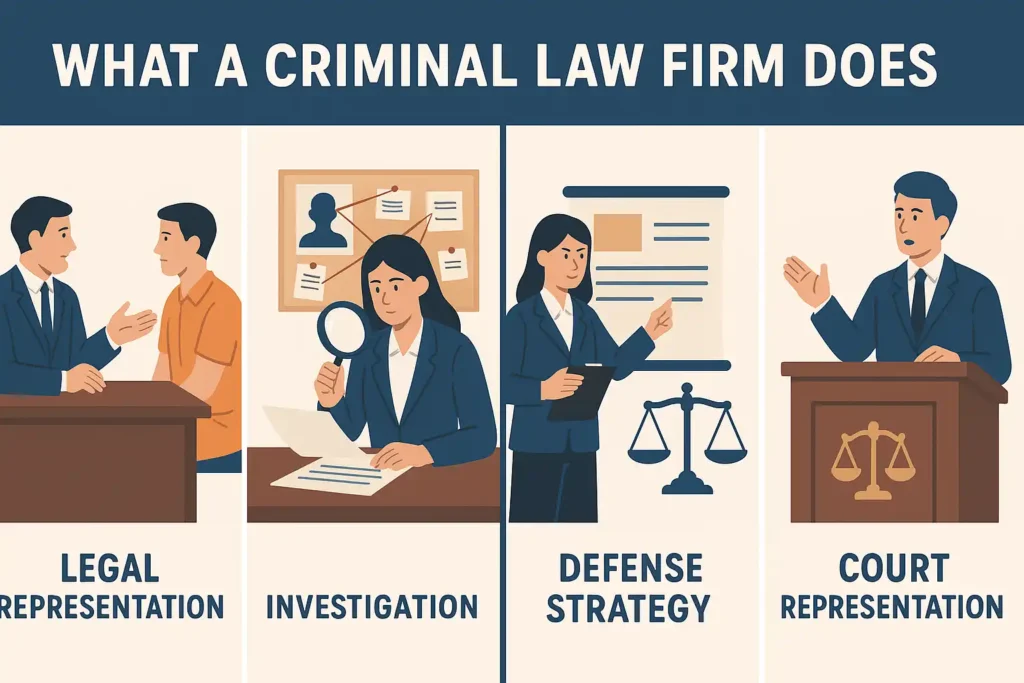Imagine answering your door to find officers waiting to question you. Fear and confusion settle in as you wonder how to protect yourself. In such a moment, a criminal law firm becomes your lifeline.
These firms offer legal representation that starts with understanding your situation and ends with fighting for the best possible outcome, whether through a negotiated plea or a full court trial.

How Criminal Law Firms Operate
A criminal law firm begins work the moment you retain its services. During the first meeting, your attorney listens without interruption to gather every fact.
That consultation sets expectations for communication, fees, and next steps. Behind the scenes, paralegals and investigators obtain police reports, interview witnesses, and commission expert analyses.
Together, the team builds a foundation to challenge evidence, negotiate with prosecutors, and, if needed, present your case before a judge or jury.
Core Services Explained
A criminal law firm offers a range of services centered on four pillars: consultation, investigation, defense strategy, and courtroom advocacy. Client consultation gives you a clear picture of your charges and rights.
Through thorough legal research, attorneys examine statutes, case law, and procedural rules to identify weaknesses in the prosecution’s case. Crafting a defense strategy may involve filing pre‑trial motions to suppress evidence collected without proper warrants or to dismiss unclear charges.
Many clients benefit from plea bargaining, which resolves over ninety percent of U.S. cases and can reduce sentences in exchange for guilty pleas citeturn0search6turn0search0.
When negotiations fail, dedicated criminal defense lawyers handle every phase of trial representation, from opening statements to cross‑examination and closing arguments. After verdict and sentencing, appeals lawyers may pursue post‑conviction relief or sentencing mitigation.
Specializations in Criminal Defense
Criminal law spans a wide array of offenses. Some firms specialize in driving under the influence, disputing breathalyzer and field sobriety test validity. Others focus on drug‑related charges, requiring meticulous forensic analysis of substances.
White‑collar crime defense demands expertise in financial records and corporate structures. Juvenile defense attorneys navigate youth court procedures and advocate for rehabilitation.
Violent crime specialists prepare strategies for cases involving assault or weapon charges. Choosing a firm whose core practice aligns with your charges maximizes your chances of success.
Typical Timelines for Case Resolution
Case durations vary by charge severity and court workload. Misdemeanor matters often resolve within three to four months after arraignment. Felony cases settled through plea bargaining average five months from initial charge to disposition.
Cases proceeding to trial can extend the timeline to seven or eight months, accounting for jury selection, witness scheduling, and post‑trial motions. Knowing these benchmarks helps you plan for bail hearings, pre‑trial conferences, and potential sentencing dates.
Understanding Legal Fees and Payment Options
Legal representation carries costs that reflect case complexity and attorney expertise. For a straightforward misdemeanor, total fees typically range between two thousand and eight thousand dollars.
Felony defense often starts at ten thousand dollars and can rise to twenty thousand or more, depending on investigatory needs and trial length. Many criminal defense lawyers charge hourly rates from two hundred to five hundred dollars, while others offer flat fees for specific services such as bail hearings or drafting motions.
Trustworthy firms present a clear retainer agreement and may offer payment plans to ease financial burden. If private counsel is beyond reach, eligible clients may qualify for a public defender, though heavy caseloads can limit one‑on‑one time.
Choosing the Right Criminal Law Firm
Selecting your defense team requires more than a web search. Verify attorney credentials, including years of criminal defense experience and bar association standing. Review case results and peer evaluations on trusted legal directories.
During your initial consultation, confirm that the lawyer you meet will oversee your case rather than delegating it entirely to junior associates.
Look for clear communication, prompt responses, and genuine empathy. A firm that makes you feel understood and secure enhances your confidence through the legal process.
Read more of:
- Best Criminal Defense Attorney in Florida
- Top Criminal Law Firms in New York
- Top Chicago Criminal Defense Law Firms
- Best Criminal Law Firms in Colorado
- Best Criminal Law Firms in America
FAQs:
When should I contact a criminal law firm?
You should reach out immediately after learning you are under investigation or facing charges. Early intervention lets your attorney secure evidence, interview witnesses promptly, and craft a proactive defense.
What happens during my first meeting?
In your initial meeting, the attorney reviews arrest records and charging documents, explains your rights, discusses potential legal strategies, and outlines fees and timelines. This session sets the tone for your entire defense.
Can a criminal defense lawyer guarantee an outcome?
No ethical attorney can promise a specific result. They can describe likely scenarios based on experience and case precedents, but every case depends on unique facts and judicial discretion.
What is a plea bargain, and how does it affect me?
A plea bargain resolves a case when you agree to plead guilty to a lesser charge or accept a reduced sentence. More than ninety percent of criminal cases in the U.S. are resolved this way because it offers certainty and often lower penalties citeturn0search6turn0search0.
How long will my case take?
Expect misdemeanor cases to resolve in roughly three to four months. Felony cases settled by plea often conclude in five months, while trials can extend total resolution to seven or eight months.
What is the difference between a public defender and a private attorney?
Public defenders are appointed by the court and represent clients unable to afford private counsel. Their caseloads are high, which can limit personalized attention. Private attorneys offer dedicated resources and individualized strategy at a cost.
